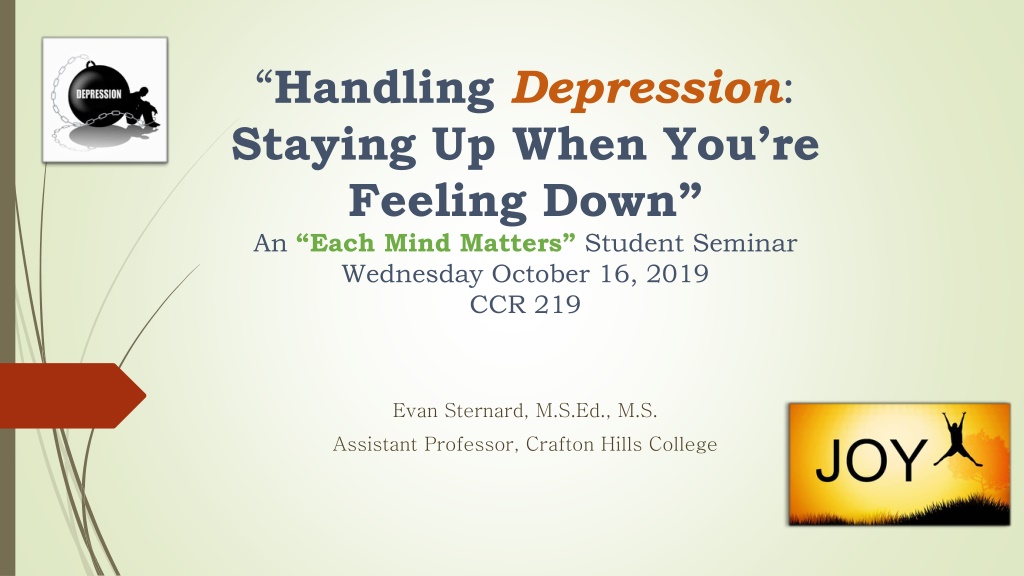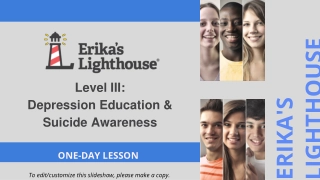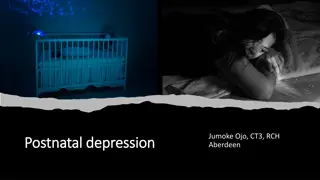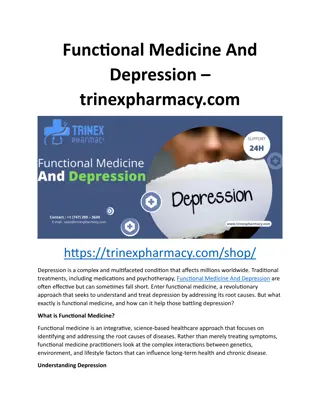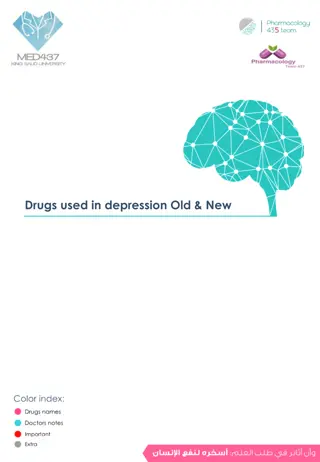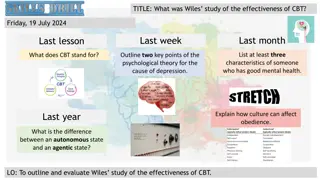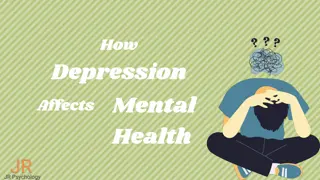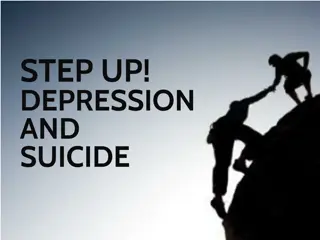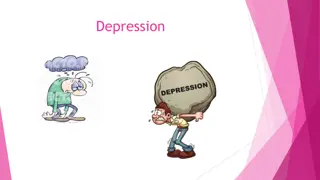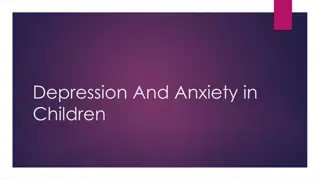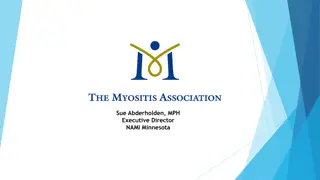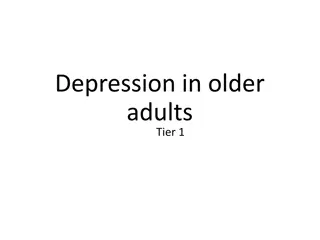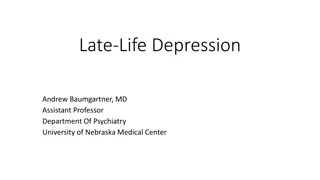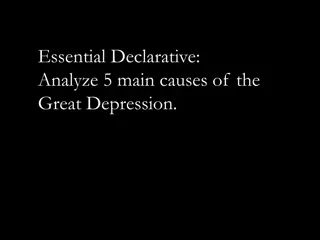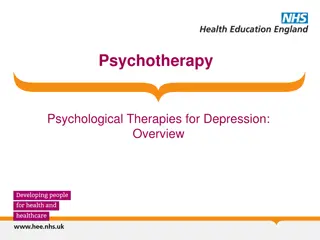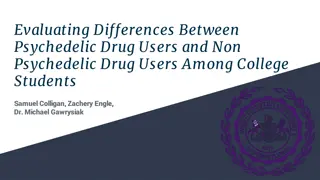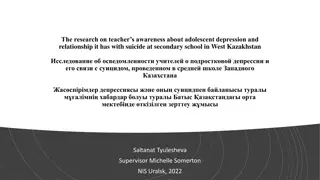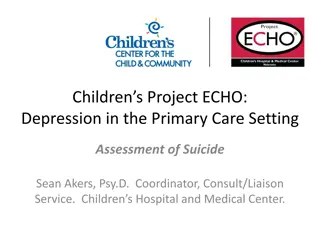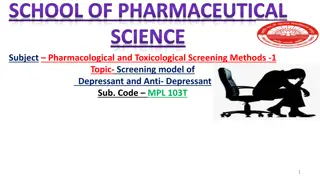Understanding Depression in College Students: Factors and Insights
Depression is a prevalent issue among college students, affecting over 39%. Factors contributing to depression include familial dynamics, intrapersonal characteristics, and external stressors. Research highlights loneliness, neuroticism, and lack of social support as key factors. Understanding these elements can help in addressing and supporting college students facing mental health challenges.
Download Presentation

Please find below an Image/Link to download the presentation.
The content on the website is provided AS IS for your information and personal use only. It may not be sold, licensed, or shared on other websites without obtaining consent from the author. Download presentation by click this link. If you encounter any issues during the download, it is possible that the publisher has removed the file from their server.
E N D
Presentation Transcript
Handling Depression: Staying Up When You re Feeling Down An Each Mind Matters Student Seminar Wednesday October 16, 2019 CCR 219 Evan Sternard, M.S.Ed., M.S. Assistant Professor, Crafton Hills College
Think for a Moment What are some factors or events, or situations, that might lead to depression in a college student?
Depression in College Students: What the Numbers Show Depression is the most common health problem for college students. Over 39% of college students felt so depressed that it was difficult to function at least once during the 2016-2017 academic school year. Over 60% of college students have felt overwhelmed by anxiety at least once in the last 12 months. Around 31% of college students have seriously considered suicide.
Causes of Depression in College Students: What Does the Research Say? A study was conducted over a 6-week The result of stepwise multiple period to investigate factors associated regression analyses of Time 1 and Time with the development of depression 2 administrations indicated that the among college students. variables most strongly and consistently associated with Subjects were 134 first-semester depression were loneliness, freshmen conscripted from the general interpersonal mistrust, and neuroticism. psychology subject pool. Two-panel cross-lagged correlational Scores were obtained from self-report analyses indicated that loneliness questionnaires involving measures of life preceded depression. events, social support, and cognitive Source: Alexander R. Rich, Martha Scovel appraisal at the beginning of the Indiana University of Pennsylvania semester and again later.
Factors Associated with Depression Contributing familial factors are: a lack of physical affection among family members and a lack of verbal intimacy with parents (Field, Diego, & Sanders, 2001); parent divorce (Short, 2002); lack of positive reinforcement (Lewinsohn et al., 1998); family violence, low family cohesion, and a family history of depression and substance abuse (Reinherz, Paradis, Giaconia, Stashwick, & Fitzmaurice, 2003); child abuse and neglect (Brown, Cohen, Johnson, & Smailes, 1999); and trauma (Turner & Butler, 2003)
Intrapersonal Depression Factors low global self-esteem (Smith & Betz, 2002); self-criticism, introversion, low assertiveness, dependency, and a need to please others (Gudleski & Shean, 2002); difficulty in adjusting to new and changing circumstances (Beeber, 1999); feeling hopeless and helpless (Furr et al., 2001); and harboring negative beliefs about the self, world, and future (Birmaher et al., 1996). Source: THE PREVALENCE AND CORRELATES OF DEPRESSION AMONG COLLEGE STUDENTS. Lindsey, Billie J., Fabiano, Patricia, Stark, Chris, College Student Journal, 01463934, Dec2009 Part A, Vol. 43, Issue 4
Major (or Clinical) Depression A constant sense of hopelessness and despair is a sign you may have major depression, also known as clinical depression. With major depression, it may be difficult to work, study, sleep, eat, and enjoy friends and activities. Some people have clinical depression only once in their life, while others have it several times in a lifetime.
What is Clinical Depression? Most people feel sad or low at some point in their lives. But clinical depression is marked by a depressed mood most of the day, sometimes particularly in the morning, and a loss of interest in normal activities and relationships -- symptoms that are present every day for at least 2 weeks.
Some Clinical Depression Symptoms Fatigue or loss of energy almost every day Feelings of worthlessness or guilt almost every day Impaired concentration, indecisiveness Insomnia or hypersomnia (excessive sleeping) almost every day Markedly diminished interest or pleasure in almost all activities nearly every day (called anhedonia, this symptom can be indicated by reports from significant others) Restlessness or feeling slowed down Recurring thoughts of death or suicide Significant weight loss or gain (a change of more than 5% of body weight in a month)
Depression: Your Feelings and Behaviors When you are depressed, what feelings besides depression are present? When you are depressed, what things do you typically do? What behaviors have you observed in others who may be depressed? When you hear the word depression, what feelings come to your mind?
Its Great to Ask For Help! If you don t ask for help, It can also lead to self- depression may get worse medication with high-risk and contribute to other behaviors with their own health problems, while serious consequences, robbing you of the academic such as binge drinking and and social enjoyment and other substance abuse and success that brought you to having unsafe sex. college in the first place.
Clinical Counseling is Available! Health and Wellness Center SSB-101 Depression Stress testing and counseling Crisis intervention Short-term situational counseling for relationship difficulties, anxiety, stress and depression. Licensed Marriage and Family Therapist available for psychotherapy. CHC students are eligible for eight FREE clinical sessions yearly with payment of the Student Health Fee!
What Else Can I Do? Don t expect to get better immediately, but you will feel yourself improving gradually over time. Besides seeing a doctor Remember that, by and a counselor, you treating your can also help your depression, you are depression by being helping yourself patient with yourself succeed in college and and good to yourself. after graduation.
Self-Care for Depression Your counselor may teach you how to be aware of your feelings and teach you relaxation techniques. Use these when you start feeling down or upset. Avoid using drugs and at least minimize, if not totally avoid, alcohol. Daily exercise, spending time outside in nature and in the sun, and eating healthy foods can also help you feel better. Get enough sleep. Try to have consistent sleep habits and avoid all- night study sessions.
(More) Self-Care for Depression Try to spend time with Break up large tasks into supportive family members or small ones, and do what friends, and take advantage of you can as you can; try campus resources, such as not to do too many things student support groups. at once. Talking with your parents, guardian, or other students who listen and care about you gives you support.
(Still) More Self-Care for Depression Try to get out with friends and try fun things that help you express yourself. As you recover from depression, you may find that even if you don t feel like going out with friends, if you push yourself to do so, you ll be able to enjoy yourself more than you thought.
Self-Help for Depression Five self-help strategies In 2016, an estimated 16.2 million adults in the United States had at least one major depressive episode 6.7 percent of all U.S. adults. But with appropriate professional and self-help strategies, recovery from depression is possible. Self-help for depression can help alleviate symptoms and put someone on the path to recovery. Exercise. Both aerobic exercise like walking or jogging and anaerobic exercise like weight lifting can help alleviate symptoms of depression. Relaxation training. Focusing on tensing and relaxing muscle groups methodically can help a person with depression relax voluntarily. You can find some guided relaxation training techniques online, like this one from Children s Mercy Hospital.
More Self-Help for Depression Self Self- -help books based on help books based on cognitive behavioral therapy cognitive behavioral therapy (CBT). (CBT). Self-help books based on CBT can help a person with depression work through some of their symptoms. Feeling Good: The New Mood Therapy and Control Your Depression (revised edition) are two books based on CBT that have been found effective in trials. Light therapy. Light therapy. Exposing the eyes to bright, full-spectrum light that mimics natural outdoor light particularly in the morning can help treat certain types of depression, like SAD (seasonal affective disorder). Light therapy is thought to affect brain chemicals linked to mood and sleep, easing SAD symptoms.
What Can I Do to Help Myself? (Thoughts from fellow college students) I cycle, which helps, and I take long walks in the country. I try to keep active, even if that's just getting out of bed, washed and ready before 10am, so that the days don't become an endless blur of nothingness. I make lists of why I feel depressed, what I can change and how I can change it. Be kind to yourself. If you need 'me time', give it to yourself. You are worth it. I've made a list of things I usually enjoy, like knitting or playing the guitar, and I try to do little bits of these activities when I'm feeling low. [What helps is] surrounding myself with friends and family who understand without pointing it out, who treat me normally but recognize that everyday life can be a struggle sometimes.
